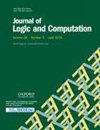基于不确定性的逻辑认知
IF 0.7
4区 数学
Q3 COMPUTER SCIENCE, THEORY & METHODS
引用次数: 0
摘要
摘要基于计划之间的不可区分关系,引入了一种新的多智能体认知算子的语义。可以说,我们的建议更接近于经典认知逻辑中已知模态的标准表示。我们研究了这种新语义和以前的方法之间的关系,表明我们的设置足够通用,可以捕获它们。我们还研究了新语义的逻辑性质。首先,我们定义了一个健全和完整的公理化。其次,我们定义了一个合适的双模拟概念,并证明了对应定理。最后,我们研究了新逻辑的模型检验和可满足性问题的计算复杂度。本文章由计算机程序翻译,如有差异,请以英文原文为准。
Uncertainty-based knowing how logic
Abstract We introduce a novel semantics for a multi-agent epistemic operator of knowing how, based on an indistinguishability relation between plans. Our proposal is, arguably, closer to the standard presentation of knowing that modalities in classical epistemic logic. We study the relationship between this new semantics and previous approaches, showing that our setting is general enough to capture them. We also study the logical properties of the new semantics. First, we define a sound and complete axiomatization. Second, we define a suitable notion of bisimulation and prove correspondence theorems. Finally, we investigate the computational complexity of the model checking and satisfiability problems for the new logic.
求助全文
通过发布文献求助,成功后即可免费获取论文全文。
去求助
来源期刊

Journal of Logic and Computation
工程技术-计算机:理论方法
CiteScore
1.90
自引率
14.30%
发文量
82
审稿时长
6-12 weeks
期刊介绍:
Logic has found application in virtually all aspects of Information Technology, from software engineering and hardware to programming and artificial intelligence. Indeed, logic, artificial intelligence and theoretical computing are influencing each other to the extent that a new interdisciplinary area of Logic and Computation is emerging.
The Journal of Logic and Computation aims to promote the growth of logic and computing, including, among others, the following areas of interest: Logical Systems, such as classical and non-classical logic, constructive logic, categorical logic, modal logic, type theory, feasible maths.... Logical issues in logic programming, knowledge-based systems and automated reasoning; logical issues in knowledge representation, such as non-monotonic reasoning and systems of knowledge and belief; logics and semantics of programming; specification and verification of programs and systems; applications of logic in hardware and VLSI, natural language, concurrent computation, planning, and databases. The bulk of the content is technical scientific papers, although letters, reviews, and discussions, as well as relevant conference reviews, are included.
 求助内容:
求助内容: 应助结果提醒方式:
应助结果提醒方式:


